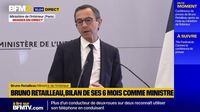Bruno Retailleau, France's Interior Minister, recently held a press conference on April 10, 2025, to outline his initiatives and review his first six months in office. This event marked a significant moment for the minister as he addressed pressing matters of immigration, naturalization, and the broader implications of his policies on French society.
During the two-hour session, Retailleau announced plans to send a circular to prefects aimed at tightening the conditions for naturalization. He emphasized that the right of residence is a privilege granted to foreigners legally residing in France, which justifies imposing conditions on it. "The right of residence is a favor granted to a regular foreigner on French soil," he stated, indicating that the government is committed to ensuring that those who seek to integrate into French society meet higher standards.
In line with this, Retailleau highlighted that the immigration law has already increased the requirements for residence permits, particularly regarding the level of French language proficiency for asylum seekers. He pointed out that language skills are crucial for integration, stating, "We know perfectly well that it is the vector of integration." This focus on language requirements aims to enhance the integration process for newcomers.
Retailleau's announcements come amid ongoing debates about immigration policy in France. He noted that the naturalization process is distinct from the right of residence and requires individuals to fulfill specific conditions. He reiterated, "The civil code always speaks, moreover, of assimilation in matters of naturalization," underscoring the importance of integrating fully into the French community.
As part of his broader immigration strategy, Retailleau also discussed recent measures implemented since he took office. These include stricter regulations regarding the right to soil in Mayotte, the prohibition of marriages in France when one party is in an irregular situation, and the establishment of waiting periods before certain social benefits are granted to asylum seekers. These steps reflect his commitment to "regaining control over immigration," a theme he has consistently promoted since assuming his role.
In terms of statistics, Retailleau reported a 20% decrease in regularizations since the issuance of a circular on January 23, 2025, which instructed prefects to tighten immigration controls. Additionally, there has been a notable increase in the number of forced removals, with a 9% rise in forced removals and a 15% increase in assisted removals from October 2024 to February 2025. This data indicates a significant shift in the government's approach to managing immigration.
Looking ahead, Retailleau announced that a list of shortage occupations, which would allow irregular workers to apply for regularization, will be published before the summer or by September 2025. This list is highly anticipated and aims to address labor shortages in specific sectors while managing immigration effectively.
Retailleau's tenure has not been without challenges. He faces competition from fellow party members, including Laurent Wauquiez, who has proposed sending dangerous foreigners under an obligation to leave the territory to Saint-Pierre-et-Miquelon. Retailleau described Wauquiez's suggestion as "at first glance bewildering," highlighting the complexities of immigration policy debates within his party.
In addition to domestic policies, Retailleau is also focusing on international relations regarding immigration. He plans to travel to Morocco shortly after the press conference to solidify progress on consular passes, an essential aspect of managing the return of migrants. His recent diplomatic efforts follow tensions with Algeria over the expulsion of individuals under the obligation to leave France, a situation he is monitoring closely.
Overall, Retailleau's press conference painted a picture of a government determined to reshape immigration policies significantly. By tightening the conditions for naturalization and emphasizing the importance of integration through language and cultural assimilation, he aims to foster a more cohesive French society. However, the effectiveness of these measures and their reception among the public and political peers remains to be seen.
As he continues to navigate the complexities of immigration reform, Retailleau's actions will likely have lasting implications for France's demographic landscape and its approach to immigration in the years to come.









